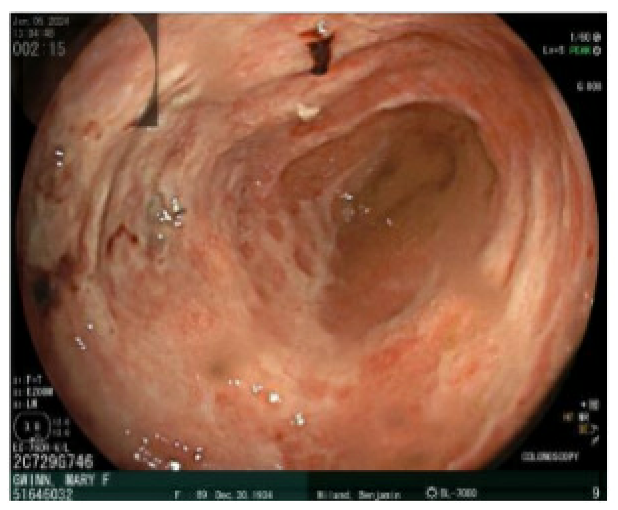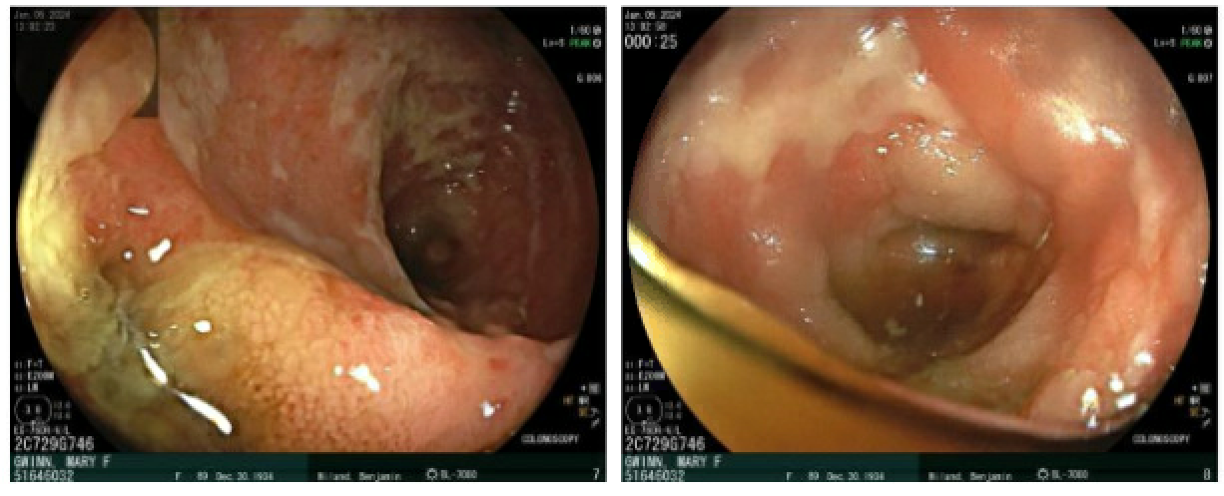Tuesday Poster Session
Category: GI Bleeding
P5244 - When the Right Side Goes Wrong: An Atypical Presentation of Isolated Right-Sided Colonic Ischemia in an Elderly Patient
Tuesday, October 28, 2025
10:30 AM - 4:00 PM PDT
Location: Exhibit Hall
- AR
Adriana Reyes, MD (she/her/hers)
University of South Alabama
Mobile, AL
Presenting Author(s)
Adriana Reyes, MD, William Dungan, MD, Baret Bercier, MD
University of South Alabama, Mobile, AL
Introduction: Isolated right-sided colonic ischemia (IRCI) is a severe form of ischemic colitis (IC) associated with high mortality and frequent need for surgical intervention. Clinical presentation can be vague leading to delayed diagnosis and poor outcomes. Risk stratification under current guidelines may have variable outcomes for high-risk elderly patient. We present a case of IRCI in an elderly patient with atypical symptoms.
Case Description/
Methods: An 89-year-old female with hypertension, coronary artery disease, diastolic heart failure, and dementia presented with a 3-day history of hematochezia and abdominal pain. She reported acute generalized abdominal pain and diarrhea for 1-week without a known trigger. She was prescribed Augmentin for suspected infectious gastroenteritis with improvement of symptoms. She later presented to the emergency department due to recurring right lower quadrant (RLQ) pain, followed by acute onset hematochezia. On admission, she was afebrile with a heart rate of 81 and blood pressure 128/60. Physical exam revealed mild RLQ tenderness and maroon-colored stool. Labs included white blood cell count 14,000/mm3 and hemoglobin 7.1g/dL. Computed tomography (CT) with contrast revealed active bleeding in the cecum. She underwent urgent colonoscopy (CSC) with findings of segmental colitis and linear ulceration involving the proximal ascending colon and cecum, concerning for IRCI. She was started on Zosyn and fluid resuscitated, conservatively. CT angiography showed moderate stenosis of the celiac and superior mesenteric arteries (SMA), and she underwent endovascular stenting of the celiac and SMA in favor of hemicolectomy 2 days later. Repeat CSC prior to discharge confirmed healing IRCI.
Discussion: Increased incidence of IRCI occurs in elderly patients with multiple comorbidities. Urgent endovascular or surgical intervention is often required and associated with poor outcomes and high mortality rates. Our patient presented atypically with absence of ischemic findings on imaging. She met moderate disease severity criteria according to the IC Mortality Risk Factors recommended by the American College of Gastroenterology. Even so, urgent CSC was pursued and confirmed IRCI which led to early diagnosis, intervention, and disease resolution. This case highlights the challenges of timely diagnosis and treatment of IRCI in elderly patients. High clinical suspicion, advanced diagnostics, and minimally invasive treatments are forefront in the improvement of care for these patients.

Figure: Cecum with linear ulceration.

Figure: Proximal ascending colon with edematous folds and friable mucosa.
Disclosures:
Adriana Reyes indicated no relevant financial relationships.
William Dungan indicated no relevant financial relationships.
Baret Bercier indicated no relevant financial relationships.
Adriana Reyes, MD, William Dungan, MD, Baret Bercier, MD. P5244 - When the Right Side Goes Wrong: An Atypical Presentation of Isolated Right-Sided Colonic Ischemia in an Elderly Patient, ACG 2025 Annual Scientific Meeting Abstracts. Phoenix, AZ: American College of Gastroenterology.
University of South Alabama, Mobile, AL
Introduction: Isolated right-sided colonic ischemia (IRCI) is a severe form of ischemic colitis (IC) associated with high mortality and frequent need for surgical intervention. Clinical presentation can be vague leading to delayed diagnosis and poor outcomes. Risk stratification under current guidelines may have variable outcomes for high-risk elderly patient. We present a case of IRCI in an elderly patient with atypical symptoms.
Case Description/
Methods: An 89-year-old female with hypertension, coronary artery disease, diastolic heart failure, and dementia presented with a 3-day history of hematochezia and abdominal pain. She reported acute generalized abdominal pain and diarrhea for 1-week without a known trigger. She was prescribed Augmentin for suspected infectious gastroenteritis with improvement of symptoms. She later presented to the emergency department due to recurring right lower quadrant (RLQ) pain, followed by acute onset hematochezia. On admission, she was afebrile with a heart rate of 81 and blood pressure 128/60. Physical exam revealed mild RLQ tenderness and maroon-colored stool. Labs included white blood cell count 14,000/mm3 and hemoglobin 7.1g/dL. Computed tomography (CT) with contrast revealed active bleeding in the cecum. She underwent urgent colonoscopy (CSC) with findings of segmental colitis and linear ulceration involving the proximal ascending colon and cecum, concerning for IRCI. She was started on Zosyn and fluid resuscitated, conservatively. CT angiography showed moderate stenosis of the celiac and superior mesenteric arteries (SMA), and she underwent endovascular stenting of the celiac and SMA in favor of hemicolectomy 2 days later. Repeat CSC prior to discharge confirmed healing IRCI.
Discussion: Increased incidence of IRCI occurs in elderly patients with multiple comorbidities. Urgent endovascular or surgical intervention is often required and associated with poor outcomes and high mortality rates. Our patient presented atypically with absence of ischemic findings on imaging. She met moderate disease severity criteria according to the IC Mortality Risk Factors recommended by the American College of Gastroenterology. Even so, urgent CSC was pursued and confirmed IRCI which led to early diagnosis, intervention, and disease resolution. This case highlights the challenges of timely diagnosis and treatment of IRCI in elderly patients. High clinical suspicion, advanced diagnostics, and minimally invasive treatments are forefront in the improvement of care for these patients.

Figure: Cecum with linear ulceration.

Figure: Proximal ascending colon with edematous folds and friable mucosa.
Disclosures:
Adriana Reyes indicated no relevant financial relationships.
William Dungan indicated no relevant financial relationships.
Baret Bercier indicated no relevant financial relationships.
Adriana Reyes, MD, William Dungan, MD, Baret Bercier, MD. P5244 - When the Right Side Goes Wrong: An Atypical Presentation of Isolated Right-Sided Colonic Ischemia in an Elderly Patient, ACG 2025 Annual Scientific Meeting Abstracts. Phoenix, AZ: American College of Gastroenterology.
